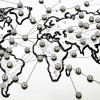
In this age of digitalization, the Internet has undeniably had a significant influence on all aspects of life. One of the most noteworthy areas where it has had an impact is in the realm of democracy. Our dependence on the Internet and its varying tools for disseminating information, political dialogues debates, and even voting processes is undeniable. We explore in-depth the impact of the Internet on democracy, discussing both its potential for fostering political engagement and its capacity to spawn disinformation and discord.
The Democratization of Information and Its Consequences
Before the advent of the Internet, information was a highly guarded resource, mostly confined to those in power. The Internet, however, has democratised its dissemination. Individuals are not just consumers of information, but also producers. Through social media platforms, blogs, and personal websites, people have a voice that breaks beyond the traditional boundaries. However, this democratization has also given rise to concerns. The authenticity and credibility of the information disseminated is not guaranteed, leading to the spread of fake news and fostering of misinformation campaigns, which can lead to socio-political instability.
The Role of Social Media in Modern Politics
Social media has empowered the masses to partake in political discourse and mobilization. Platforms like Twitter, Facebook, and YouTube have become vital tools for politicians to communicate with their electorates, and for activists to mobilize support for causes. However, it also provides a platform for political propaganda, hate speech, and division. The Cambridge Analytica scandal is a prime example of how social media can be manipulated for political gains, impacting democratic processes.
Internet and Political Activism
The Internet has been instrumental in the rise and success of various socio-political movements around the world. From the Arab Spring in the Middle East to the Black Lives Matter movement in the United States, the Internet has proved indispensable for mobilizing supporters, disseminating information, and maintaining momentum. The potential of the Internet as a tool for political activism is enormous, but so is its potential for sparking civil unrest and radicalization.
Online Voting: A Future for Democracy?
Technology has begun to play an evolving role in voter participation. Countries like Estonia have already implemented e-voting, bringing the democratic process into the digital age. While online voting has the potential to increase voter turnout, it also raises serious concerns about security and voter privacy. Ensuring the transparency and integrity of an online voting system is paramount for the sustenance of democracy.
The Dark Side: Internet Censorship and Surveillance
While the Internet has immense potential to facilitate democratic process, it can also threaten it. Internet censorship by governments and corporates curtails freedom of speech and access to information, important pillars of a democratic society. Conversely, digital surveillance poses threats to privacy, another fundamental democratic right. Whistleblowers like Edward Snowden have shed light on how the Internet can be employed by governments and corporates to infringe privacy in the name of national security or corporate interests.
















